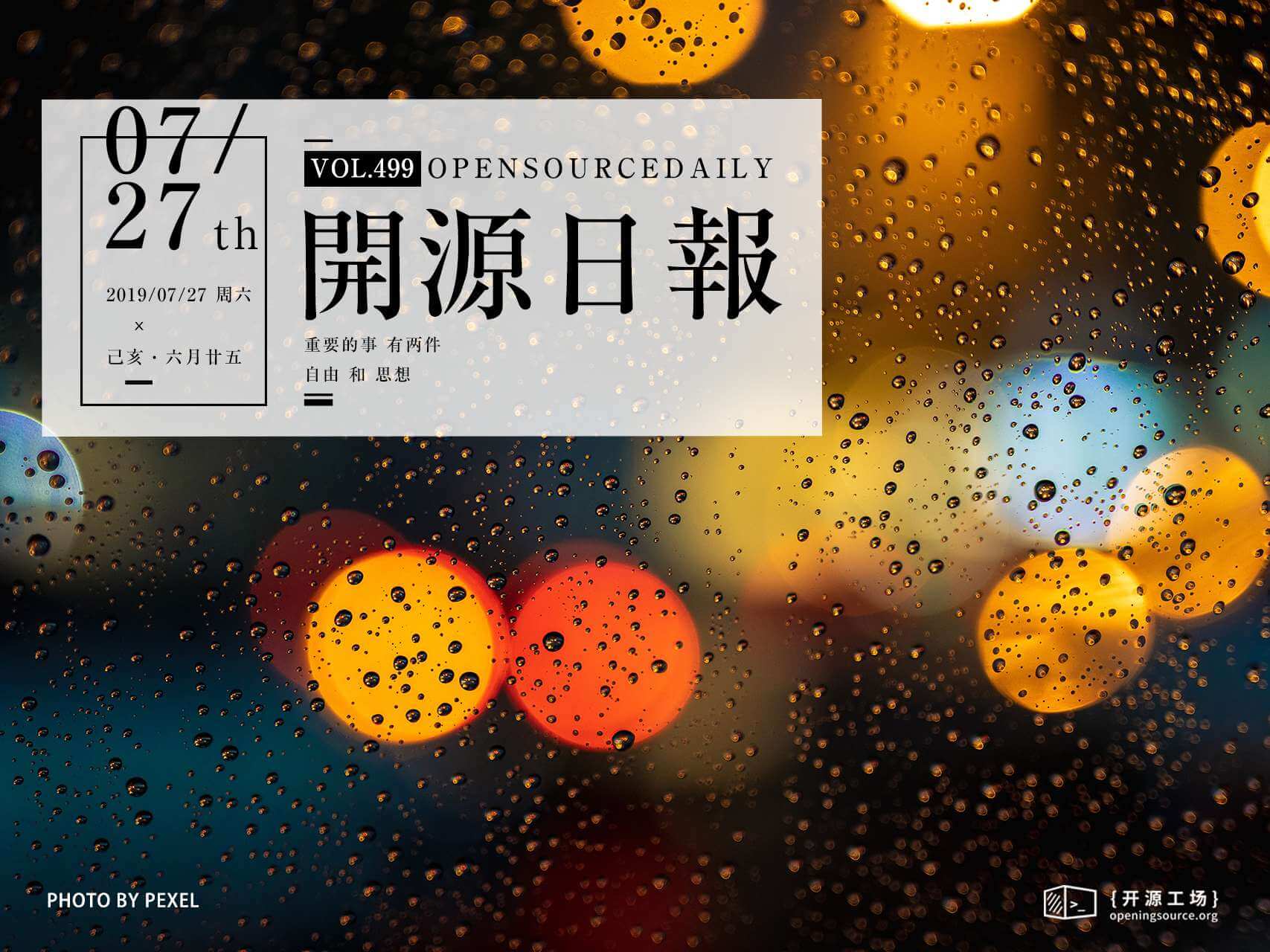今日推薦開源項目:《最初的一步 saylovewall》
今日推薦英文原文:《Should I Quit My Job Today?》

今日推薦開源項目:《最初的一步 saylovewall》傳送門:GitHub鏈接
推薦理由:現在大學高中里都會有個叫表白牆的玩意——簡單地說就是匿名表白吧,形式可能有差異但大抵如此。這個項目就是一個表白牆的開源版本,比起用 QQ 空間什麼的來弄效果會更好。不過雖然說,表白這種事情,是應該堂堂正正一對一如同騎士對決一樣正面交鋒的,這是最原始也是最能表示決心的辦法,這一點還是不要忘了才好。
今日推薦英文原文:《Should I Quit My Job Today?》作者:Omar Rabbolini
原文鏈接:https://medium.com/swlh/should-i-quit-my-job-today-ad71a99ce872
推薦理由:工作與樂趣有時難以得兼,舍……這就要自己決定了
Should I Quit My Job Today?
When it is time to call it a day for a dissatisfied engineer
Another day, another feature. Such was the life at this startup I joined in my early years in Hong Kong. Every iteration would bring new requirements for the product, and tight deadlines along with them. We used to work an average of ten hours a day, and leave the office well past 10pm as releases neared. It seemed what we did was never enough, and we were always playing catch up with the latest business requirements.Yet, I stuck with it, and so did the rest of the engineering team. Why did we put ourselves through such an ordeal?
In my case, it was a combination of factors: I needed a job to keep my visa going, I wanted to prove myself as a manager (and later VP), especially in a new country, and I liked making mobile software. The fact we used bleeding edge technology also helped, and so did the great connection I shared with my team members. We were a big family, and I regret that our eventual acquisition came with a relocation package to the UK which, while great for the rest of them, did not really work for me as I had no intention of moving back West.
I thought about that chapter of my life this past week as a few people I met are struggling with the will to carry on with their job, some because of the delicate situation that Hong Kong is facing at the moment, others more simply because their manager or their company is, or has become, uninspiring for a number of different reasons.
The real question is: does it make sense to stick to a job when you are no longer inspired?
The five pillars of motivation

Photo by Hans Reniers on Unsplash
Motivation to work in a startup or product company really boils down to the following considerations:
- Technology : You are working on something which is innovative, new and exciting
- Product : You are building something unique, and you are doing it well
- Mission : You are solving an important problem, or something you deeply care about
- Culture : You share the same values as the people around you, throughout the organization. You feel you are treated fairly, and there is trust between you and your colleagues, within and outside your team.
- Motivation-By-Proxy : The work you are doing is a proxy to satisfy specific needs in your life, or reach certain goals (e.g. sustaining yourself, prestige, saving money to retire early / starting a family, etc.)
In the majority of cases, one or more aspects are dissatisfactory or misaligned with one』s goals and beliefs. If you are in this situation, you should look at the positive aspects of your job and decide whether they are reason enough to stay. Assuming the problems you are seeing are not coming from within the core of the company, there is a chance that they might be resolved as time goes by.
In fact, this is a good chance for you to be the change that you need in your organization. Working with your peers and your manager should help you see these issues through, either by actually resolving them, or by reframing your perception as you gain a more complete picture of the situation. For instance, a tedious feature set which makes it look like the company has given up on innovation might reveal itself as being in actuality a short-term goal required to win a specific client over.
In any circumstance, it is important to have a good understanding of the actual state of the company and your role before making a decision. Do not be afraid to ask for information and gather as much detail as possible from veritable sources, especially when the issues you are facing come from one of the first three pillars: Technology, Product and Mission.
Timing and tolerance

Photo by NeONBRAND on Unsplash
「The two most powerful warriors are patience and time」 — Leo TolstoyTolerance levels vary from person to person. Somebody might be able to live just on Motivation-By-Proxy for years on end, while a more ambitious individual would only put up with, let』s say, an issue with the product roadmap only if it is bound to be resolved within a couple of quarters.
When looking into quitting, it is important to consider whether the issue is temporary or permanent, and whether you can live with it for as long as it persists.
When you are in the thick of things, it is difficult to see the light at the end of the tunnel and instead fall into a pattern of thought that makes whatever issue we are facing seem like a permanent reality. When considering whether to quit in these cases, it is beneficial to delay the decision until the 「dark period」 is over so that we can take a step back and consider the issue in the right perspective.
Also on the topic of timing, it is important to consider the financial impact of the decision on your life. There is always a risk that whatever endeavor you might partake does not work out as expected. This risk of course varies depending on the nature of your next chapter, for instance quitting to become an entrepreneur is more risky than leaving for a new job which is already lined up, but should nevertheless be taken into account.
The real you

Photo by Rahul Dey on Unsplash
Is it really a success if you are succeeding at what you do not like doing?The five pillars of motivation we looked at earlier are a framework to help you find the motivation to stick around. They do not deal with your lifetime goals, and they assume the job you are doing fits in your overall life purpose. But what if this is not the case?
You are where you are today undoubtedly because of prior choices in your life. Maybe you decided to study Computer Science because you were good at Math and your parents thought technology was a viable career, but you really liked to play the violin instead. Maybe you have a knack for writing, but never wrote anything beyond technical specs because you thought you are not good enough.
Notwithstanding the commitments you already made in your life, you should never give up on your true passion. Maybe you buried it under a pile of success and achievements, or maybe you locked it away to conform to certain expectations from your family, community and society at large.
Maybe your dissatisfaction with your current job is a subconscious reaction of your true self to the artificial cage you built around it. Maybe it』s time to set yourself free.
Working on your passion does not necessarily require a radical change in your work. You do not need to completely switch overnight and restart your career from scratch.
You can ease into your new career by choosing a freelance or part-time gig related to your present profession to keep the money flowing as you spend more time developing your new skillset.
Alternatively, you can look for a company where you can apply both and make a transition over time. For instance, if music is your thing and you are a software engineer, maybe you can look at companies that produce music software. That might give you the opportunity to network with professional musicians and allow you to either change career, or otherwise express your talents by doing both something you like and something you are good at.
Wrapping up

Photo by Craig Garner on Unsplash
In conclusion, the decision of quitting revolves around whether the time you are investing in your current job is time well spent. In other words, is it aligned with and does it help you achieve your lifetime goals? The moment this is no longer the case, you can safely leave with no regrets. After all, time is a finite commodity.
Also, the people factor is important. Are you working with people you can trust? Is your manager and your organization supportive of your growth? Any misalignment here might affect how quickly you reach your goals, and therefore should be of major consideration in your decision.
下載開源日報APP:https://openingsource.org/2579/
加入我們:https://openingsource.org/about/join/
關注我們:https://openingsource.org/about/love/
